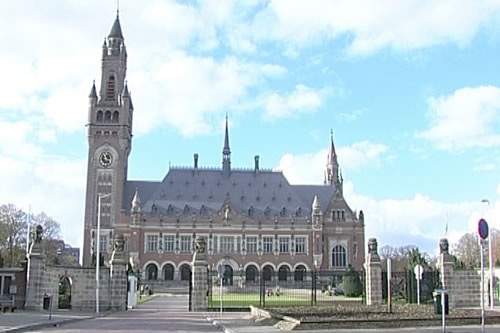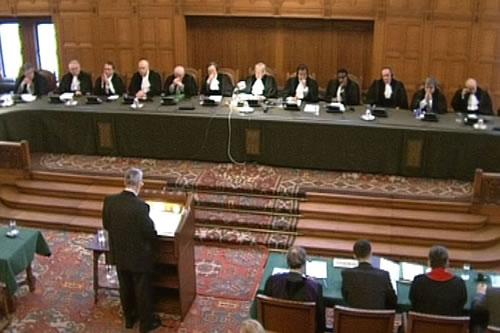Home
SERBIA AND MONTENEGRO VS. NATO
The International Court of Justice schedules a public hearing on the jurisdiction and admissibility in the case of "legality of the use of force" filed by the Belgrade authorities against NATO member-states five years ago.
 ICJ Headquarter in Den Haag
ICJ Headquarter in Den Haag Public hearings on the preliminary objections of the eight NATO member-states against whom the former Federal Republic of Yugoslavia (now Serbia and Montenegro) filed applications before the International Court of Justice will be held between 19 and 23 April 2004, it was announced in The Hague today.
The proceedings concerning "legality of use of force" were instituted on 29 April 1999, when the Belgrade authorities filed applications to the International Court of Justice, as the highest legal institution of the UN ruling in court cases involving states, to order an immediate stop to the air strikes against the FRY. After three days of public hearings, the International Court rejected the application of Belgrade in June 1999, but agreed to conduct proceedings on the merits – "illegal use of force" and possible breaches of the Convention on Genocide – provided that in the procedure that was instituted it is determined that it has jurisdiction to conduct proceedings on the matter. It was determined at that time that it did not have jurisdiction to consider the cases of the FRY v. USA and Spain, since when these states acceded to the Convention on Genocide they placed a caveat on the article accepting the jurisdiction of the world supreme court. The Federal Republic of Yugoslavia was then given until January 2000 to file written argument on the merits of the case, while the other side the eight NATO member-state which had not placed such a caveat were ordered to file a written counter-memorial, dealing with the arguments presented by Belgrade.
After the FRY filed its written motions augmenting its claims on the "illegal use of force" and alleged breaches of the Convention on the Prevention and Punishment of the Crime of Genocide, eight NATO member-states – Belgium, Canada, France, Germany, Italy, Netherlands, Portugal and the United Kingdom – filed preliminary objections to the jurisdiction of the International Court and the admissibility of the Belgrade case. The International Court suspended the consideration of the merits of the case until a decision on these objections has been reached.
Since Belgrade has in the meantime filed its counter-memorial to the preliminary objections of the eight NATO members, the International Court scheduled public hearings on the jurisdiction and admissibility of the proceedings instituted by Belgrade five years ago. The outcome of the debate will determine whether the proceedings for the consideration of the merits of the case – legality of use of force between states – will be conducted.
Whether this will be considered at all will depend among other things on the political decisions of the Belgrade authorities since giving up further lawsuits against NATO is one of the prerequisites for the admission of Serbia and Montenegro to the Partnership for Peace program.
Photos

